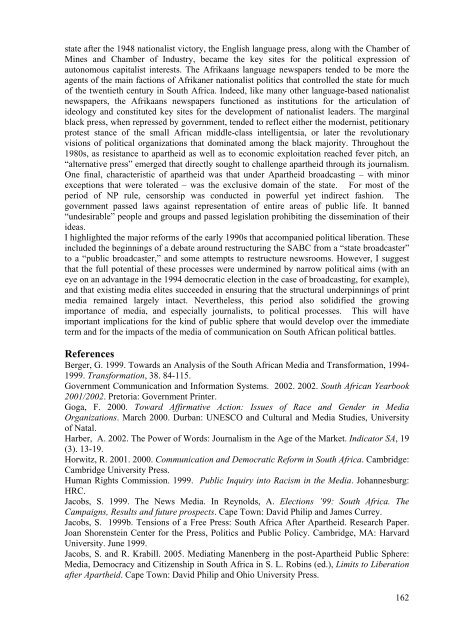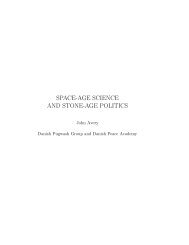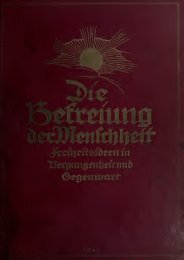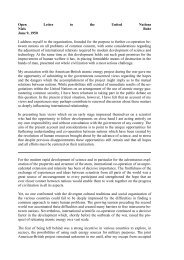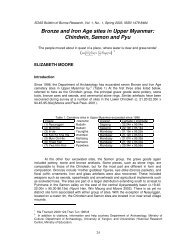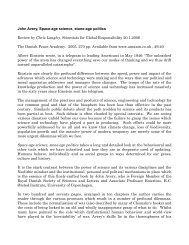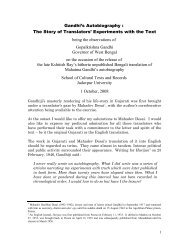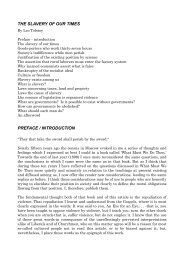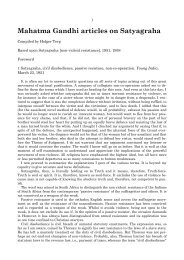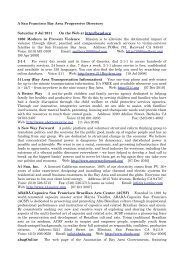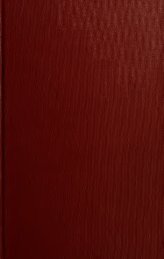History in the new South Africa: an introduction - Det danske ...
History in the new South Africa: an introduction - Det danske ...
History in the new South Africa: an introduction - Det danske ...
Create successful ePaper yourself
Turn your PDF publications into a flip-book with our unique Google optimized e-Paper software.
state after <strong>the</strong> 1948 nationalist victory, <strong>the</strong> English l<strong>an</strong>guage press, along with <strong>the</strong> Chamber of<br />
M<strong>in</strong>es <strong>an</strong>d Chamber of Industry, became <strong>the</strong> key sites for <strong>the</strong> political expression of<br />
autonomous capitalist <strong>in</strong>terests. The Afrika<strong>an</strong>s l<strong>an</strong>guage <strong>new</strong>spapers tended to be more <strong>the</strong><br />
agents of <strong>the</strong> ma<strong>in</strong> factions of Afrik<strong>an</strong>er nationalist politics that controlled <strong>the</strong> state for much<br />
of <strong>the</strong> twentieth century <strong>in</strong> <strong>South</strong> <strong>Africa</strong>. Indeed, like m<strong>an</strong>y o<strong>the</strong>r l<strong>an</strong>guage-based nationalist<br />
<strong>new</strong>spapers, <strong>the</strong> Afrika<strong>an</strong>s <strong>new</strong>spapers functioned as <strong>in</strong>stitutions for <strong>the</strong> articulation of<br />
ideology <strong>an</strong>d constituted key sites for <strong>the</strong> development of nationalist leaders. The marg<strong>in</strong>al<br />
black press, when repressed by government, tended to reflect ei<strong>the</strong>r <strong>the</strong> modernist, petitionary<br />
protest st<strong>an</strong>ce of <strong>the</strong> small <strong>Africa</strong>n middle-class <strong>in</strong>telligentsia, or later <strong>the</strong> revolutionary<br />
visions of political org<strong>an</strong>izations that dom<strong>in</strong>ated among <strong>the</strong> black majority. Throughout <strong>the</strong><br />
1980s, as resist<strong>an</strong>ce to apar<strong>the</strong>id as well as to economic exploitation reached fever pitch, <strong>an</strong><br />
“alternative press” emerged that directly sought to challenge apar<strong>the</strong>id through its journalism.<br />
One f<strong>in</strong>al, characteristic of apar<strong>the</strong>id was that under Apar<strong>the</strong>id broadcast<strong>in</strong>g – with m<strong>in</strong>or<br />
exceptions that were tolerated – was <strong>the</strong> exclusive doma<strong>in</strong> of <strong>the</strong> state. For most of <strong>the</strong><br />
period of NP rule, censorship was conducted <strong>in</strong> powerful yet <strong>in</strong>direct fashion. The<br />
government passed laws aga<strong>in</strong>st representation of entire areas of public life. It b<strong>an</strong>ned<br />
“undesirable” people <strong>an</strong>d groups <strong>an</strong>d passed legislation prohibit<strong>in</strong>g <strong>the</strong> dissem<strong>in</strong>ation of <strong>the</strong>ir<br />
ideas.<br />
I highlighted <strong>the</strong> major reforms of <strong>the</strong> early 1990s that accomp<strong>an</strong>ied political liberation. These<br />
<strong>in</strong>cluded <strong>the</strong> beg<strong>in</strong>n<strong>in</strong>gs of a debate around restructur<strong>in</strong>g <strong>the</strong> SABC from a “state broadcaster”<br />
to a “public broadcaster,” <strong>an</strong>d some attempts to restructure <strong>new</strong>srooms. However, I suggest<br />
that <strong>the</strong> full potential of <strong>the</strong>se processes were underm<strong>in</strong>ed by narrow political aims (with <strong>an</strong><br />
eye on <strong>an</strong> adv<strong>an</strong>tage <strong>in</strong> <strong>the</strong> 1994 democratic election <strong>in</strong> <strong>the</strong> case of broadcast<strong>in</strong>g, for example),<br />
<strong>an</strong>d that exist<strong>in</strong>g media elites succeeded <strong>in</strong> ensur<strong>in</strong>g that <strong>the</strong> structural underp<strong>in</strong>n<strong>in</strong>gs of pr<strong>in</strong>t<br />
media rema<strong>in</strong>ed largely <strong>in</strong>tact. Never<strong>the</strong>less, this period also solidified <strong>the</strong> grow<strong>in</strong>g<br />
import<strong>an</strong>ce of media, <strong>an</strong>d especially journalists, to political processes. This will have<br />
import<strong>an</strong>t implications for <strong>the</strong> k<strong>in</strong>d of public sphere that would develop over <strong>the</strong> immediate<br />
term <strong>an</strong>d for <strong>the</strong> impacts of <strong>the</strong> media of communication on <strong>South</strong> <strong>Africa</strong>n political battles.<br />
References<br />
Berger, G. 1999. Towards <strong>an</strong> Analysis of <strong>the</strong> <strong>South</strong> <strong>Africa</strong>n Media <strong>an</strong>d Tr<strong>an</strong>sformation, 1994-<br />
1999. Tr<strong>an</strong>sformation, 38. 84-115.<br />
Government Communication <strong>an</strong>d Information Systems. 2002. 2002. <strong>South</strong> <strong>Africa</strong>n Yearbook<br />
2001/2002. Pretoria: Government Pr<strong>in</strong>ter.<br />
Goga, F. 2000. Toward Affirmative Action: Issues of Race <strong>an</strong>d Gender <strong>in</strong> Media<br />
Org<strong>an</strong>izations. March 2000. Durb<strong>an</strong>: UNESCO <strong>an</strong>d Cultural <strong>an</strong>d Media Studies, University<br />
of Natal.<br />
Harber, A. 2002. The Power of Words: Journalism <strong>in</strong> <strong>the</strong> Age of <strong>the</strong> Market. Indicator SA, 19<br />
(3). 13-19.<br />
Horwitz, R. 2001. 2000. Communication <strong>an</strong>d Democratic Reform <strong>in</strong> <strong>South</strong> <strong>Africa</strong>. Cambridge:<br />
Cambridge University Press.<br />
Hum<strong>an</strong> Rights Commission. 1999. Public Inquiry <strong>in</strong>to Racism <strong>in</strong> <strong>the</strong> Media. Joh<strong>an</strong>nesburg:<br />
HRC.<br />
Jacobs, S. 1999. The News Media. In Reynolds, A. Elections ’99: <strong>South</strong> <strong>Africa</strong>. The<br />
Campaigns, Results <strong>an</strong>d future prospects. Cape Town: David Philip <strong>an</strong>d James Currey.<br />
Jacobs, S. 1999b. Tensions of a Free Press: <strong>South</strong> <strong>Africa</strong> After Apar<strong>the</strong>id. Research Paper.<br />
Jo<strong>an</strong> Shorenste<strong>in</strong> Center for <strong>the</strong> Press, Politics <strong>an</strong>d Public Policy. Cambridge, MA: Harvard<br />
University. June 1999.<br />
Jacobs, S. <strong>an</strong>d R. Krabill. 2005. Mediat<strong>in</strong>g M<strong>an</strong>enberg <strong>in</strong> <strong>the</strong> post-Apar<strong>the</strong>id Public Sphere:<br />
Media, Democracy <strong>an</strong>d Citizenship <strong>in</strong> <strong>South</strong> <strong>Africa</strong> <strong>in</strong> S. L. Rob<strong>in</strong>s (ed.), Limits to Liberation<br />
after Apar<strong>the</strong>id. Cape Town: David Philip <strong>an</strong>d Ohio University Press.<br />
162


